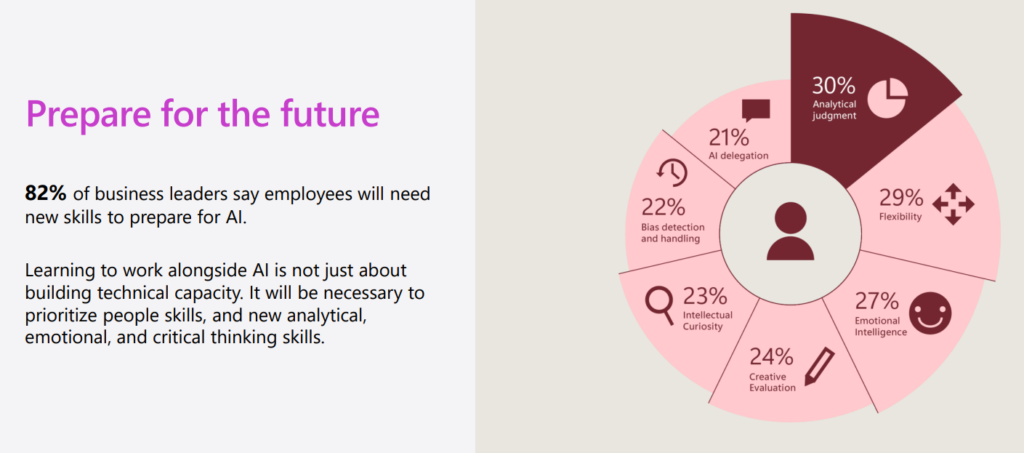AI extends far beyond technical positions. Many roles across various industries now require an understanding of AI and its implications. It is therefore important to understand the breadth of opportunities where AI literacy can be valuable. Below are some examples:
AI Integrator: Companies need individuals who can bridge the gap between AI technology and its practical applications.
Data Analyst/Interpreter: Analysing and interpreting data is increasingly important across industries. AI literacy enables professionals to leverage advanced analytics tools and interpret AI insights.
Ethics and Policy Advisor: AI raises ethical and regulatory concerns. Understanding the ethical implications of AI and contributing to policy discussions is invaluable.
Customer Experience Manager: AI plays a significant role in enhancing customer experiences through personalised recommendations, chatbots, and predictive analytics. Professionals in this area benefit from understanding how AI can be utilised to improve customer engagement.

Navigating AI’s Impact on Job Roles
It is also important to adapt as a job seeker so you are aware how AI can have an impact on your chosen career path.
Positive Impacts: AI can streamline workflows, automate repetitive tasks, and provide valuable insights from data analysis, ultimately enhancing productivity and innovation in many roles.
Negative Impacts: It’s essential to acknowledge potential challenges such as job displacement , algorithmic bias relating to EDI. You should stay informed about these issues and develop skills to adapt to changing job requirements.
Mitigation Strategies: Stay proactive by continuously upskilling and expanding your skill set. It is important to prioritise the development of transferrable skills such as critical thinking, creativity, and adaptability, which are less at risk to automation.
Shift from Manual to Strategic Tasks

With AI automating routine and repetitive tasks such as data entry, scheduling, and basic analysis, humans will be freed up to focus on more strategic and creative aspects of their roles.
Marketing and Advertising: Spend less time on manual tasks like campaign setup and optimization, and more on strategic planning, content creation, and interpreting AI-generated insights to craft effective marketing strategies.
Recruitment: There will be a shift from time-consuming tasks like CV screening to higher-value activities such as relationship building, candidate engagement, and cultural fit assessment.
Higher value activities provide opportunities to make more informed decisions, collaborate with AI systems, and continuously upskill to stay relevant in evolving job roles across Marketing, Advertising, Recruitment, Retail wider sectors.
Researching Company Stance on AI
Cultural Fit: A company’s approach to AI reflects its values and priorities. You can research how AI is integrated into the company culture and whether it aligns with your own beliefs and career goals.
Innovation and Growth Opportunities: Companies that are early AI adoptors may offer unique opportunities for professional development. As part of your research explore how company’s AI initiatives align with your long-term career aspirations.
Ethical Considerations: Find out how companies address ethical concerns related to AI, such as transparency, fairness, and accountability. Do they align to your values and do you feel comfortable supporting these initiatives?
Depending on the sector or field you are in artificial intelligence will have varying levels of acceptance and use.

Important!:
When applying for roles, you should be careful to use AI responsibly if you decide to use these tools to help you with your application. It is incredibly easy to spot an AI-generated application in the recruitment process, and many companies also use anti-AI software.
Including AI Knowledge on your CV
Highlight Relevant Skills: If students possess AI-related skills such as data analysis, machine learning, or programming languages commonly used in AI development, they should feature them prominently in their skills section.
Demonstrate Application: Provide examples of how you have applied AI knowledge in academic projects, internships, or extracurricular activities. This demonstrates practical experience and relevance to potential employers. Providing url links to showcase examples of your work is a good way of showcasing your experience.
Tailor to Job Descriptions: When applying for roles where AI literacy is valued, tailor your CV to highlight specific experiences and competencies relevant to the job requirements. Also use the same words and terminology as this will help to personalise your CV.
Continuous Learning: To future proof your professional brand engage with lifelong learning in the field of AI. You can include AI related certifications, courses, or self-study initiatives to showcase your commitment to staying current in this evolving field.

Read: Use Copilot to develop a job-hunting strategy | Microsoft
There are also plenty of other ways that AI Tools can help you in your job hunt. Read this article from Microsoft to find out more.
Preparing for Job Interviews
If you struggle with interviewing for job roles, don’t worry – you’re not alone!
However, Generative AI tools like Copilot can help you prepare for interviews by giving tips on answering common interview questions.
Here are some examples of questions you can ask Copilot to help you prepare:
- I’m applying for an entry-level data science position. What are some questions I can expect in the interview?
- What’s a good way to answer questions about your weaknesses in a job interview?
- I often say “like” and “um” in job interviews. Can you give me tips to help me stop using these filler words?
- What are some good questions to ask the interviewer at the end of the interview?

Apply Your Thinking:
Use Copilot to help you create a list of interview questions.
What job are you looking for after university? Use Copilot to develop 10 interview questions related to the role you want.






